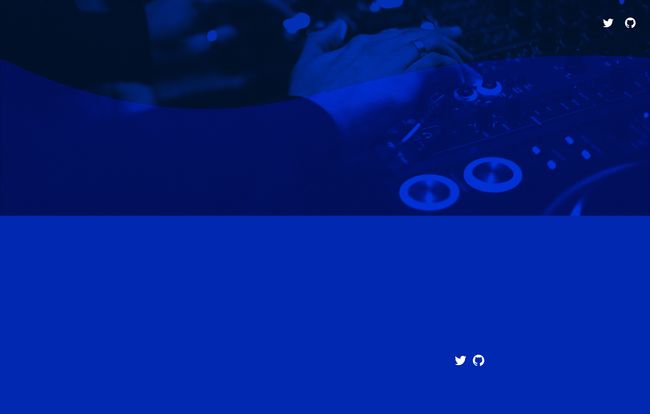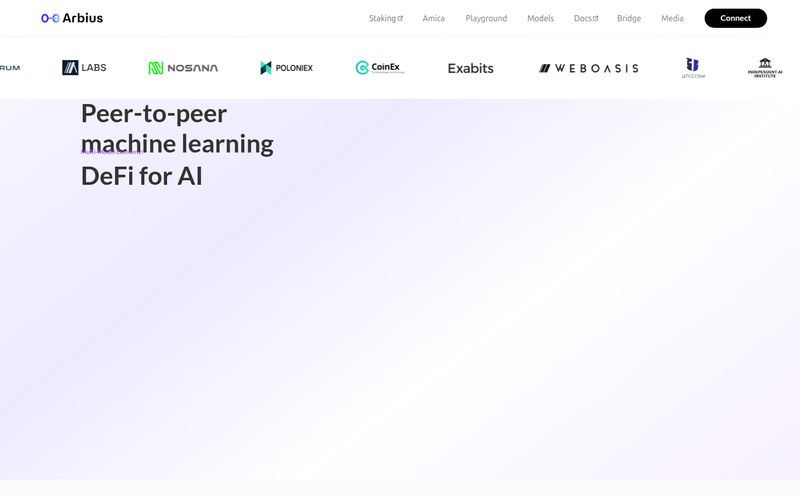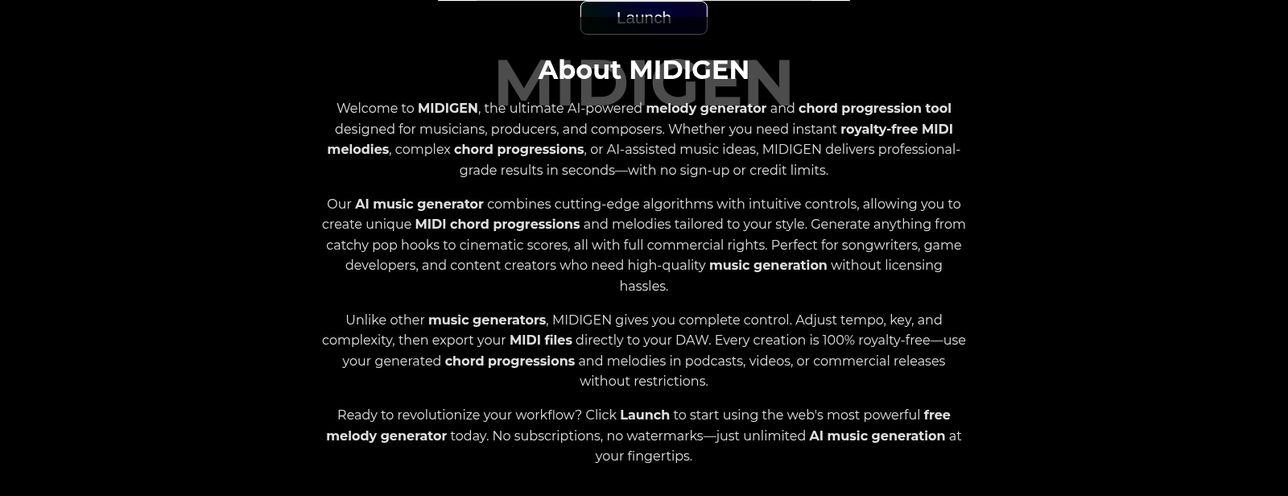For the past couple of years, my feeds have been absolutely flooded with AI-generated everything. We've all seen the photorealistic portraits of people who don't exist and the wild, fantastical landscapes cooked up by tools like Midjourney and DALL-E. It’s been a visual explosion. But the whole time, I've been sitting here, tapping my fingers, wondering... where's the audio revolution?
Creating custom music or even just a unique sound effect for a video project can be a massive hurdle. You either pay hefty licensing fees for stock audio that a thousand other people are already using, or you spend ages trying to learn a complex Digital Audio Workstation (DAW) that looks like the control panel of a space shuttle. It's a pain.
Well, the audio revolution is finally here, and it’s not coming from some slick, walled-off corporation. It's coming from a community, and its name is Harmonai.
What Exactly is Harmonai, Anyway?
At its heart, Harmonai is a community and a project backed by none other than Stability AI—yeah, the folks behind the Stable Diffusion image model. They're focused on building open-source generative audio tools. The mission is simple but powerful: make music production more accessible, more fun, and less of a headache for everyone.
Think of it as a sonic sandbox. Instead of being limited by pre-made sample packs, Harmonai gives you the tools to generate your own custom, potentially infinite library of sounds. It's about empowering artists and creators, not replacing them. This isn't about pushing a button to create a chart-topping hit (not yet, anyway). It's about giving you the raw, creative clay to mold into something uniquely yours.
The Core Idea: Democratizing Sound Creation
For years, the tools for high-quality audio creation have been locked behind steep learning curves and even steeper price tags. Harmonai kicks the door wide open. By being open-source, it’s not just a product; it’s a movement. Developers from all over the world can contribute, fix bugs, and add new features. It’s a living, breathing project that grows with its community.
I’ve always felt that the best tech is the kind that removes barriers. This feels like one of those moments. It's for the YouTuber who needs a unique intro theme, the indie game dev who needs atmospheric soundscapes, or the musician who's just stuck in a creative rut and wants to play with some truly novel sounds. It lowers the floor without putting a ceiling on creativity.
Who is This For? (Not Just for Tech Wizards)
While the open-source nature might sound a bit intimidating, the focus here is genuinely on accessibility. The goal is to create tools that don't require a Ph.D. in computer science to operate. Of course, if you are a developer, you can pop the hood and tinker to your heart's content. That’s the beauty of it. It serves both the casual creator and the hardcore coder.
My Honest Take: The Good, The Bad, and The Geeky
No tool is perfect, especially one that’s built by a community in the wild west of AI development. So let's get into the nitty-gritty. I spent some time poking around their GitHub page and seeing what the community is buzzing about. Even their website has that classic open-source project feel... I actually hit a 404 page while poking around, which, in a weird way, is kind of reassuring. It's real people building real things, not some polished, faceless corporation.
The Upsides of Harmonai
The biggest, most obvious advantage is that it’s free and open-source. This cannot be overstated. In an industry where a single software license can cost hundreds of dollars, this is a breath of fresh air. The community-driven development means it's constantly improving in ways its users actually want. It's not about a product manager's roadmap; it's about the community's needs. Finally, the potential for creating truly unique and innovative sounds is off the charts. You're not just picking from a list; you're collaborating with an AI to invent something new.
A Reality Check: The Potential Hurdles
Let's be real for a second. This isn’t a simple plug-and-play app you download from the App Store. Because it’s an open-source project, you might need a little technical know-how to get things up and running. Support comes from community forums and Discord channels, not a 24/7 customer service line, so you're relying on the goodwill and availability of fellow users and developers. And, of course, the quality and features are directly tied to the project's progress. It’s an evolving beast, which is exciting but also means it can be a bit rough around teh edges.
| Pros | Cons |
|---|---|
| Completely free and open-source | May require some technical knowledge to install/use |
| Community-driven, ensuring constant improvement | Support is based on community contributions (forums, Discord) |
| Focused on accessibility for beginners | Features and quality depend on the project's development stage |
| Huge potential for creating innovative sounds | Can be less polished than commercial alternatives |
How Does Harmonai Work Under the Hood?
Without getting too lost in the technical weeds, Harmonai uses a type of AI called a diffusion model, similar to its image-generating cousins. These models are trained on massive datasets of audio. They learn the patterns, textures, rhythms, and timbres that make up music and sound. When you give it a prompt or input, it essentially works backward, starting from noise and refining it step-by-step into a coherent piece of audio that matches your request.
It’s like a sculptor who starts with a block of marble (the noise) and, knowing what a statue should look like (the training), chips away until the final form is revealed. The real magic is that you get to influence the sculptor's vision.
The Big Question: Is Harmonai Really Free?
Yes. One hundred percent. Zero. Zilch. Nada. No subscriptions, no hidden fees, no credit card required. It's open-source. The 'payment' is being part of a community, maybe contributing a bug report, helping another user, or if you're a coder, contributing to the project itself. It's a different, and frankly, more refreshing model of building technology.
Final Thoughts: Is Harmonai Worth Your Time?
If you are a creator of any kind—musician, podcaster, video editor, game developer—I think the answer is a resounding yes. At the very least, it's worth keeping a very close eye on. Will it replace Pro Tools or Ableton Live tomorrow? No. But that's not the point.
Harmonai represents a fundamental shift in how we can create. It's a tool of empowerment, a wellspring of inspiration, and a peek into a future where your imagination is the only true bottleneck. It’s a bit messy, a bit geeky, but it’s bursting with potential. And in a world of polished, expensive software, there's something wonderful about that.
Frequently Asked Questions about Harmonai
- What is generative audio?
- Generative audio refers to sound or music that is created by an artificial intelligence system. Instead of playing back a pre-recorded file, the AI generates new audio content based on its training and the user's input.
- Do I need to be a programmer to use Harmonai?
- Not necessarily. While a technical background helps, the community is working on making the tools more user-friendly. However, you should be comfortable with concepts like using GitHub and possibly running command-line scripts, depending on the specific tool.
- Is the music I create with Harmonai copyright-free?
- This is a complex and evolving area of law. Generally, since Harmonai is open-source and the models are intended for creative use, the output is often considered yours to use. However, you should always check the specific licenses of the models you are using and consult a legal professional for commercial projects.
- Where can I find and download Harmonai's tools?
- Everything is hosted publicly on the Harmonai organization's GitHub page. That's the central hub for all their code, projects, and documentation.
- How is Harmonai different from other AI music generators?
- The key difference is its open-source and community-driven nature. While many other AI music tools are commercial products with subscriptions, Harmonai is a collaborative project that is free for everyone to use, inspect, and modify.
- Is Harmonai related to Stability AI?
- Yes, Harmonai is a Stability AI Lab. This means it has the backing and resources of one of the leading companies in the generative AI space, while still maintaining its community-driven focus.
Reference and Sources
- Harmonai Official GitHub: https://github.com/harmonai-org
- Stability AI: https://stability.ai/




